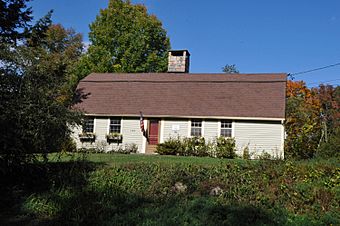David Chapman Farmstead facts for kids
Quick facts for kids |
|
|
David Chapman Farmstead
|
|
 |
|
| Location | 128 Stoddards Wharf Rd., Ledyard, Connecticut |
|---|---|
| Area | 2 acres (0.81 ha) |
| Built | 1744 |
| Architectural style | Colonial, Postmedieval English |
| MPS | Ledyard MPS |
| NRHP reference No. | 92001642 |
| Added to NRHP | December 14, 1992 |
The David Chapman Farmstead is a very old house located at 128 Stoddards Wharf Road in Ledyard, Connecticut. It was built around 1744. This house is a great example of a country farmhouse from that time. It was built by a family member of one of Ledyard's first settlers. The farmstead was added to the National Register of Historic Places in 1992.
About the Farmhouse
The David Chapman Farmstead is in a quiet, rural area. It sits on the north side of Stoddard Wharf Road. This is just west of where the road crosses Stoddard Brook.
What the House Looks Like
The house is a 1-1/2 story building made of wood. It has a special roof called a gambrel roof. This type of roof has two different slopes on each side. There is a large chimney in the middle of the house.
The outside walls are covered with wooden boards called clapboards. The front of the house has five window and door openings. These are called "bays." The main door is near the middle. The windows and door are close to the roof's edge. Inside, you can see parts of the original building. This shows how it was built a long time ago.
How the House Was Built
The house was built in two main parts by David Chapman. He was the grandson of William Chapman, one of the first landowners in the area. The oldest part of the house is the eastern half. It was built around 1744.
This first part had one room on the ground floor. It also had a small attic space above it. You had to use a ladder to get to the attic. In 1756, David Chapman added the western half of the house. He likely also changed the roof to the gambrel style we see today.
There is also a barn on the property. David Chapman might have built this barn too. The way the barn was built suggests it is also from the 1700s.



